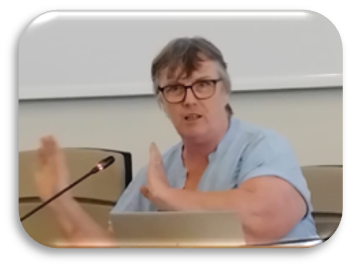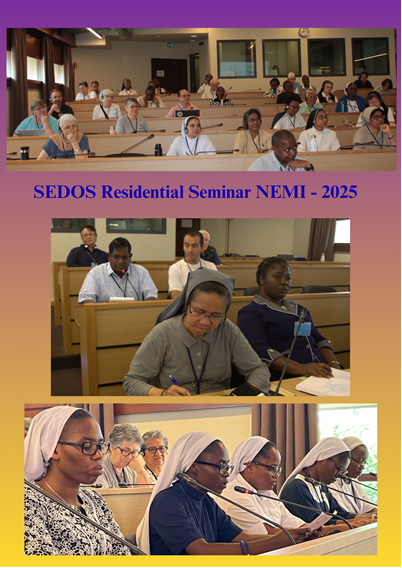Welcome Address Missionary Institutes and Synodality – Charism, Prophecy, and Mission
Mary T. Barron, OLA

Dear Sisters and Brothers in Christ,
Members of SEDOS, Honoured Guests,
It is with profound joy and gratitude that I welcome you to the SEDOS Residential Seminar 2025. As we gather here today, we stand at a pivotal moment in the life of the Church, one that calls us to discern deeply, to listen attentively, and to respond courageously to the movement of the Holy Spirit.
The theme of our seminar — Missionary Institutes and Synodality: Charism, Prophecy, and Mission — is not merely a topic of discussion, but an urgent invittion to reflect on our specific call as Missionary Institutes in the light of synodality. In a time when the Church seeks renewal and deeper communion, we are challenged to embrace the prophetic dimension of our vocations with renewed vigour, shaping our mission with the spirit of dialogue, discernment, and co-responsibility.
Speaking to the Society of African Missions just 10 days ago, Pope Leo spoke of them, and by inference of all Missionary Institutes, saying that they are “a sign of that missionary spirit which is at the very heart of the Church’s life” (cf. Evangelii Gaudium, 273). He reminded them that their “Founder’s advice … remains ever timely: in your proclamation, be faithful to the simplicity of the apostolic preaching, and be always ready to embrace the “folly of the Cross” (cf. 1 Cor 1:17-25) with sincerity and peace, even in the face of the world’s incomprehension and derision. Be free of all conditioning as men [and women] “filled” with Christ, and thus capable of bringing your brothers and sisters to an encounter with him, since you are motivated by a sole aspiration: to proclaim the Gospel to the whole world” (cf. Phil 1:12-14, 21). He concluded with the encouraging and challenging statement: “What a great sign for the entire Church and the world!”
During these days, as we reflect on our specific call as Missionary Institutes in the light of synodality, this question will be in the background: in what way are we called today to be this ‘great sign for the entire Church and the world?’
In preparing this Residential Seminar, we, the Members of the SEDOS Executive Committee were convinced of the need as Missionary Institutes to deepen our reflection on the call to missionaries today in the light of Synodality. When the entire Church is experiencing an awakening towards becoming missionary disciples, what is the ‘more’ being asked of the Missionary Institutes?
We were also convinced that we wanted this residential seminar to be a synodal experience for all participants. And this requires the commitment of all of us gathered here to prepare our own reflections so we speak with parrhesia; to open our minds and hearts to deep listening, to encounter.
Synodality is not simply a method; it is a way of being Church together. It calls us to walk together, to listen to the voices of all God’s people, and to recognize the Spirit’s presence in the collective journey of faith. For us as missionary institutes, synodality illuminates our charisms, urging us to remain faithful to our roots while responding dynamically to the needs of our time. We are not merely institutions; we are living witnesses, called to embody the Gospel and proclaim its message with authenticity and courage. As we journey together synodally, it is not only our method of being missionary that is transformed, but our very understanding of the Gospel message we are called to proclaim. In this year in which the Church celebrates the ordinary Jubilee as Pilgrims of Hope, Pope Francis in his message for World Mission Day 2025 reminded us to be “Missionaries of Hope Among all Peoples” reminding the community of the baptized of our fundamental vocation to be, in the footsteps of Christ, messengers and builders of hope…. Faced with the urgency of the mission of hope today, Christ’s disciples are called first to discover how to become “artisans” of hope and restorers of an often distracted and unhappy humanity.”
In a recent talk, Timothy Radcliffe OP, spoke of Synodality and The Culture of Encounter. In a world culture and society increasingly marked by division and polarization, he spoke of the call today, of the task of the Synod, and thus the task of synodality as being
more exciting and radical than just overcoming a polarization in society, it is to be a sign of the Christ who draws all to himself when he is lifted up… this is a marvellous vocation for the Church in a time of social disintegration, increasing violence and war.
As the Global Church is called to live interculturality, to embrace the vast plurality of cultures in her membership, in our Missionary Institutes we must be living signs, showing how intercultural living is not only possible, but fruitful and generative. Now that is a true challenge for all of us! Is our intercultural living fruitful and generative?
As Radcliffe describes it: “Interculturality for us, you could say is the womb of revelation”. The further we go on our intercultural journeys within Congregations, among Congregations, with those cultures in which we live and witness, the more the fullness of our missionary call is revealed to us, and the more fully we understand the Gospel message we are called to proclaim as living witnesses.
Radcliffe explored in depth the type of encounter to which we are called in synodality. When I hear the word ‘encounter’ it reminds me immediately of our dear Pope Francis. May he rest in perfect peace. It is a word he used very frequently – the importance of encounter as Christians; But more than simply speak about the importance of encounter, Pope Francis lived this message: his sense of being present to each and every person he met, his compassion and care for the peripheries witnessed to the truth about encounter. He said ‘We must cultivate a culture of encounter “as Jesus did”: not just seeing, but looking; not just hearing, but listening; not just passing people by, but stopping with them; not just saying “what a shame, poor people!”, but allowing yourself to be moved with compassion; “and then to draw near, to touch and to say: ‘Do not weep’ and to give at least a drop of life”.
In his exploration of The Culture of Encounter in Synodality, Radcliffe captures the heart of reciprocity as essential for synodality, urging us to move beyond complementarity, which fits pieces neatly together, towards reciprocity, which opens a dynamic and evolving dialogue — allowing identities to be discovered in relationship rather than predetermined. As missionaries, as we embrace our diversity of charisms, our diversity of states of life, our diversity of gender, in relationship with each other, each one of us understands at an ever-deeper level our identity, our charism, our call.
Radcliffe highlights that true mutuality is about an ongoing exchange, like waves shaping each other in the sea. This reciprocity transforms our understanding of roles — whether in ministry, or cultural diversity, we are equal, but different, and shaped by encounter.
The challenge for all of us is how we embody this as we embrace the synodal journey. What gestures can reveal the life-giving encounters at the heart of synodality? How do we renew our language, imagination, and mutual understanding, our reciprocity? As Pope Francis teaches, the culture of encounter requires listening, touching, and allowing ourselves to be moved.

During these days of reflection, prayer, and exchange, may we seek to discern what the Spirit is saying to us. How can we as Missionary Institutes enter into the womb of revelation that is our intercultural living in a way that generates life? How can we intentionally foster reciprocal relationships that bear fruit in the authentic living out of our charisms for today, thus contributing to the synodal renewal and reform of the entire Church? How are we being called to be prophets in today’s world? How can our mission reflect the unity, diversity, and hope of a Church that listens, learns, and loves?
Let us embark on this seminar with open hearts and minds, ready to listen, ready to dialogue, and above all, ready to be transformed by the Spirit who calls us forward. May our discussions be fruitful, our encounters be enriching, and our resolutions be courageous.
Welcome to this sacred time of discernment and renewal. May the Lord bless our journey together.
Thank you.